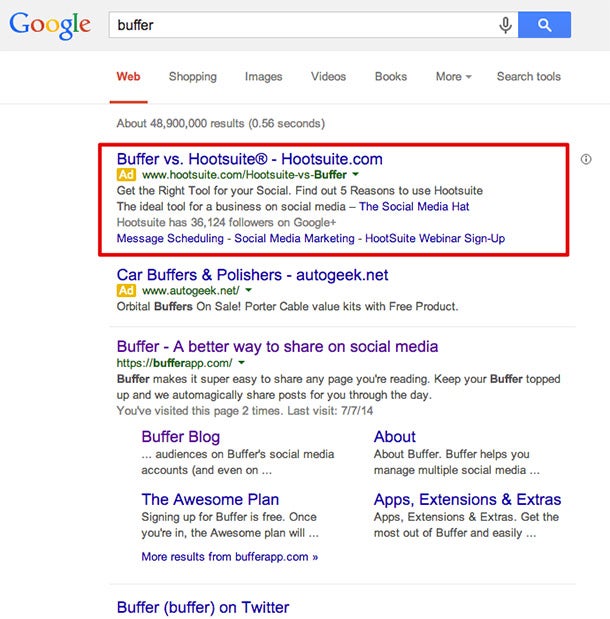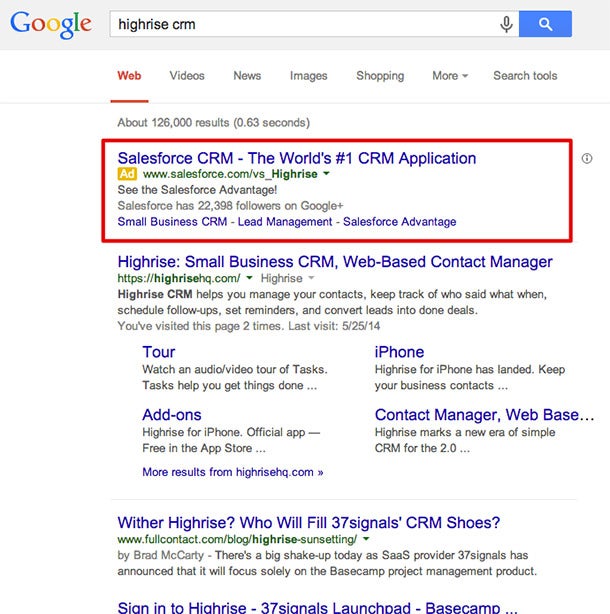Is Paid Search Ineffective for Online Marketing? Pay-per-click marketing is fraught with confusion, mistakes and a lot of wasted cash. But when you get it right, PPC can be indispensable. Here's some insight and some tips.
By Neil Patel Edited by Dan Bova
Opinions expressed by Entrepreneur contributors are their own.
Is paid search ineffective? This a provocative question on a pretty big issue.
This article could go viral if I started off with a "HECK, YES!" and launched into a diatribe against pay-per-click (PPC) and its attendant evils. But I'd rather give value than go viral.
Instead, I'm exploring the issue from both sides -- from the side of those who say that it's ineffective and those who say it's indispensable.
I do believe that the field of PPC is fraught with confusion, amateurish fumbles, and a lot of wasted cash. AdWords is easy to use, but hard to strategically implement. Few marketers do any testing. A/B or multivariate testing is key to digital marketing success. Click-through-rates (CTRs) are important, but the real value is in conversions.
These mistakes and others like them are why PPC has gotten a bad rap. Let's take a look at both sides of the issue -- arguments in favor of, and arguments against paid search.
Related: The 7 Essential Steps to Monitoring Your Online Reputation
3 Arguments in Favor of Paid Search
1. Paid search is highly targeted.Paid search has the power to target specific users who search for specific things. As the thinking goes, such bids would attract conversion-ready visitors. You can focus on geographic regions, segment your audience, and massage the results to only get the visitors in your target market. Hubspot states, "PPC allows you this type of granular control over where your ads are displayed."
2. Paid search is quantifiable and metric-driven.One of the greatest appeals of search-engine marketing (SEM) is the profusion of data, metrics, and ROI. From the bidding process to the line graph reports, marketers love data. And with good reason. Data tells a story, defines direction, and sketches out a strategy for future marketing activity.
In spite of SEM's status as a deep well of data, we need to keep in mind that Google has a history of enhancing privacy and restricting data.
Small businesses or new entrants to the marketplace sometimes need the boost that PPC can give. They lack the ability to gain organic traffic right away, so the easiest way to gain exposure is through paid search. Sure, there may not be a huge CTR or ROI, but at least there's a growing awarenessof the new brand through paid search.
Ebay's landmark study on paid search concluded that "the efficacy of SEM is limited," but went on to qualify their statement by saying, "this would most likely not be true for small and new entities that have no brand recognition, which must pay in order to appear at the top of a search page for any given query."
Related: 8 Advanced Webmaster Tools You Should Be Using for Better SEO
3 Arguments against Paid Search
1. Organic search (SEO) has a higher ROI than PPC.The most common and strongest argument against PPC is the ROI argument, which goes like this: SEO costs little; PPC costs a lot. But both SEO and PPC attract traffic. Since SEO traffic is less expensive, more authentic, and has higher conversion rates then it follows that SEO has a higher ROI.
The argument is often bereft of data. It's hard to quantify ROI from organic search, because it's hard to quantify a company's investment in organic search. Furthermore, it's difficult to pit SEO and PPC against each other as if they were the only two contestants in a pitched battle over search. We need more nuance before we get all huffy over the SEO vs. PPC issue.
In spite of this, it's evident that organic search does get results, does get clicks, and does have an ROI. Logic drives us to the inescapable fact that -- barring freakish anomalies -- SEO is a superior acquisition channel...most of the time.
2. Organic results improve when PPC is absent.Ebay analyzed click-through on branded terms spanning a period in which they suspended paid search. What they found is that click-throughs either stayed the same or rose after disabling PPC campaigns.
By design, paid clicks were driven to zero when advertising spending was suspended. At the same time, there was a noticeable uptake in natural clicks. This is strong evidence that the removal of the advertisement raises the prominence of the eBay natural search result.
Yes, but keep in mind that we're talking about branded keywords. Already, eBay possessed ownership of these terms, so competition was nil, and CTRs remained high. Branded keywords will remain strong, regardless.
But in further testing, eBay successfully deconstructed the illusion of PPC success in nearly every other area of PPC potential -- non-branded terms, customer response heterogeneity (i.e., user segmentation), product response heterogeneity, and channel substitution. In each area, their findings revealed that SEM is a waste of money. "The results of our study show that for a well-known brand like eBay, the efficacy of SEM is limited at best."
Google, meanwhile, came up with opposite results, claiming that "a full 89 percent of the traffic generated by search ads is not replaced by organic clicks when ads are paused."
EBay's inflammatory research paper with its uninflammatory title ("Consumer Heterogeneity and Paid Search Effectiveness: A Large Scale Field Experiment"), put it this way: "The non-brand keyword experiments show that SEM had a very small and statistically insignificant effect on sales."
Their assertion was that most searchers are looking for information on a product or service and are not ready to buy. Most PPC bidding happens in the embattled keyword territory of product searches such as "gibson guitar" or "samsung galaxy s5." However, as eBay's study pointed out, people who want these products are already aware of where they are going to purchase the product. They are looking for information, because "advertising informs consumers of the characteristics, location and prices of products and services that they may otherwise be ignorant about." Thus, while display ads may have a marginal persuasive function upon product demand, searchers are more likely to seek out highly informational sources for their query.
Ads aren't informational. They are promotional. If searchers are indeed looking for information on a product or service, they aren't going to click an ad and convert. They might click an ad to get a sense of pricing or reviews, but not to purchase. As the logic goes, PPC bids are a waste of money -- eliciting click-through rates from information-seekers, not customers.
3 Strategic Techniques for Search Strategy
Now what? Rather than lunge to one side or the other, take a strategic approach to PPC.
Most PPC experts advise that you bid on your own branded keywords. I say it depends. If you have a unique brand name and no one else is bidding on it, there's usually no need to spend extra money for CTRs on a search engine results page (SERP) that is already covered with your organic results.
For example, there aren't any other businesses or blogs called "ConversionXL." It would be a waste of PPC budget for this company to bid on their own brand name. Why? Because they already dominate the SERPs.

Remember these two points:
If your brand name has no PPC competition, then don't worry about bidding on it.
If your brand is massive (e.g., eBay), then don't worry about bidding on it.
In order to be broad, however, I'm going to pose a counterintuitive strategy in the point below. Just hope that your competitor is not reading this article...
Related: How Google 'Sitelinks' Can Improve Your SEO
You are legally permitted to use the branded terms of your competitors, but you must be careful.The pitfalls of doing it wrong can land you in a courtroom, and you don't want that. The upside of bidding on your competitor's keywords is getting your business some visibility in an area that you would otherwise be excluded from.
Hootsuite is bidding legally on the term "buffer." Buffer, the app, controls all the above-the-fold organic listings for their brand name, but they do not have any PPC market share.

Salesforce bids for the term "highrise crm."

If you're interested in bidding on a branded keyword, you should read the AdWords Trademark Policy, and maybe get some insight from your lawyer. The restrictions are few, but there are some.
The Advertising Blog puts forward these qualifications for bidding on competitor keywords:
If it's not trademarked, you can bid on it
If it is trademarked, but the copyright holder hasn't filed an exception request with Google, you can bid on it AND use it in advertising copy
If it's trademarked and the owner has filed an exception request, you can bid on it, but you can't use it in your ad copy
In the U.S., if you sell a specific product, service it, or provide information about it, you can bid on that keyword and use it in ad copy.
Google only monitors certain countries for keyword trademark violations (Australia, Brazil, China. Hong Kong, Macau, New Zealand, North Korea, South Korea. and Taiwan).
I can't help but end this article with a call to content marketing, with or without the infusion of some extra PPC traffic. Content wins the day. Today's savvy searchers and shoppers are looking for the best information from the most reliable source. If you provide that great information and reliability, then you'll gain the search traffic and conversions that you need.
Do you use paid search? Why or why not?
Related: 12 Things You Should Do on Your Personal Google+ Account Right Now










